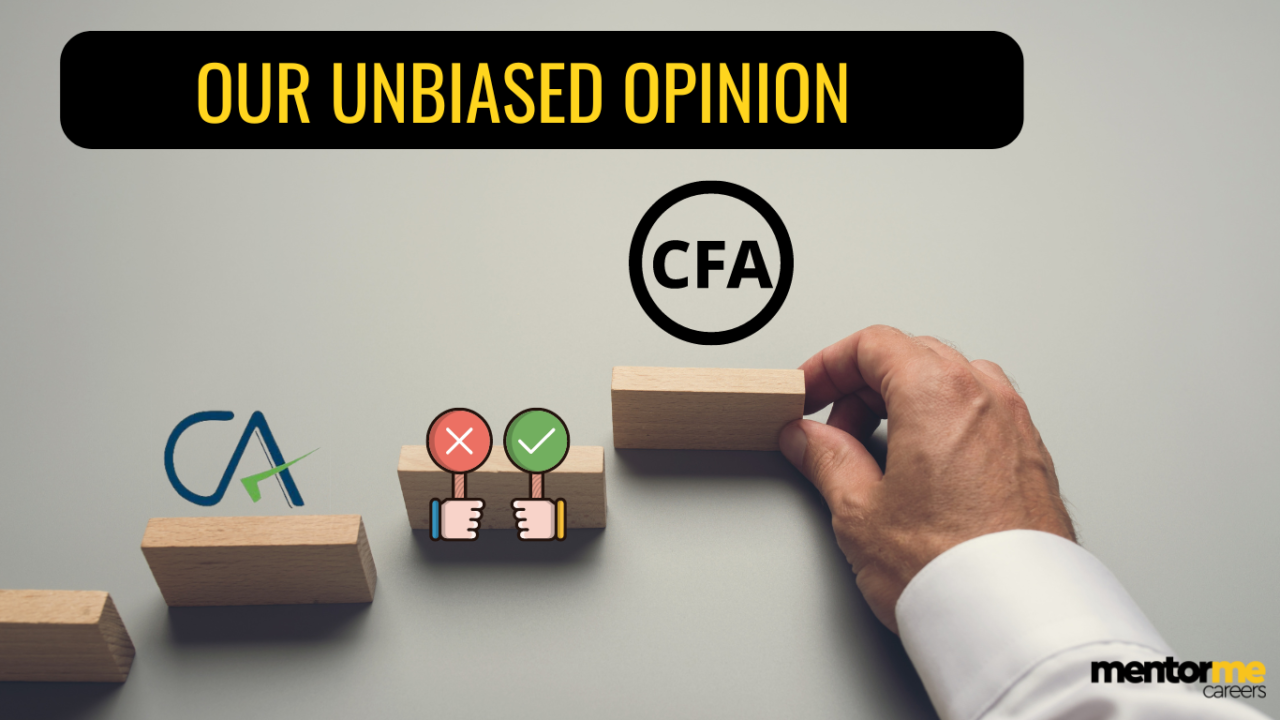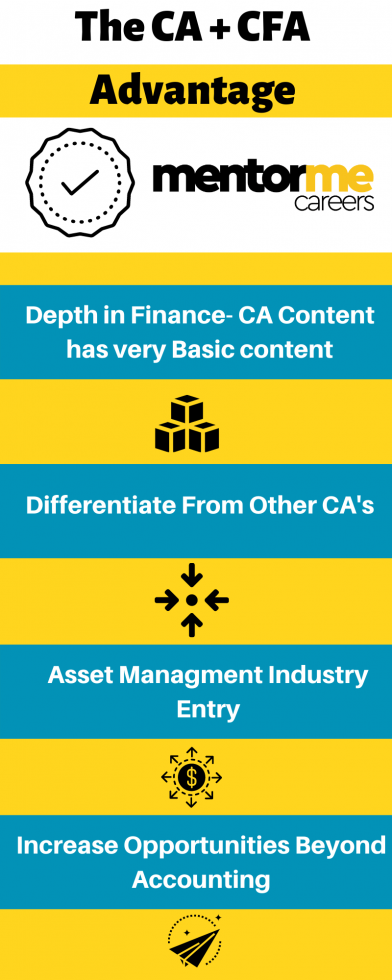Last updated on January 28th, 2026 at 04:30 pm

“The path to success, is to find your passion, embrace uncertainty and not worry about outcomes” If the thought of doing CFA after CA has occurred in your mind, you are not alone!I have come across many CA finalists, who start planning for CFA a year before the actual preparation.You have come to the right place, and I will make sure that you don’t have to browse any more articles to find this answer.At the end I will also share some easy formula to check if this talked about qualification is for you or not. So Lets get started !I have picked up the most common questions CA background students and working professionals have about CFA. Here is the list of questions, I will answer from.
Difference Between CFA Vs CA
Chartered financial analyst program or popularly known as CFA, is a U.S based investment finance qualification established in 1947 by FAF Foundation. CA on the other hand is a regulatory compliance qualification, specific to a country like India.
- Field: CA is a core accounting qualification, whereas CFA is an investment finance qualification. Both specialise for different domains and have their own niche that they serve
- Roles: While a CA can definitely work in the investment industry without any additional qualifications but CFA candidates or charterholders cannot work in an accounting profession without CA. That doesn’t mean that CFA is not beneficial to do for a CA or CA Inter
- Governing Body: CFA is controlled by CFA institute U.S, while CA is controlled by ICAI India
- Levels and Duration: CFA has three levels and takes about 1.5 Years to complete ( No article ship in between). CA on the other hand has CPT, IPCC, Final with articleship compulsory
- Syllabus: Both programs are widely different in terms of their core focus, while CA syllabus has may be just one subject on financial management. On the other hand CFA syllabus has 10 subjects on investments
- Difficulty: CFA and CA both are prestigious and difficult exams to clear. CFA level 1 has about 44% pass rate, level 2 – 45% and level 3 – 55%. CA has a pass rate of around 15% in its final exams
- Exams: CFA exams happen now in a computerised format 4 times a year in level 1, two times in level 2 and level 3. CA Exams on the other hand haven’t changed much.
- Pattern: CFA exams are completely MCQ based in two levels and essay in the third level
CFA vs CA: A Comprehensive Comparison
| Aspect | CFA | CA |
|---|---|---|
| Primary Focus | Finance and Investment Management | Accounting, Auditing, and Taxation |
| Global Recognition | Highly recognized globally | Primarily recognized in India |
| Industry | Investment Banking, Portfolio Management | Accounting, Auditing, Corporate Taxation |
| Aspect | CFA | CA |
|---|---|---|
| Time Required | 4-5 Years (Typically Part-Time) | 4-5 Years (Full Commitment) |
| Levels | Three Levels | Three Levels (Foundation, Intermediate, Final) |
| Exam Format | Multiple Choice and Item Set | Descriptive and Objective |
| Aspect | CFA | CA |
|---|---|---|
| Total Cost | ₹3-4 Lakhs | ₹1-2 Lakhs |
| Additional Costs | Study Material, Membership Fees | Coaching Fees |
| Aspect | CFA | CA |
|---|---|---|
| Pass Rates | ~40-50% per level | ~5-10% (Final Level) |
| Conceptual Depth | Finance and Investments | Accounting, Taxation, Law |
| Memorization | Concept-Based | Heavy Memorization |
Advantages of doing CFA Program after CA
I am going to answer this simply at a very broad level, since CA adds a lot of credibility already in the industry. More than just showcasing that you have many degrees, its about displaying your core interest in finance with CFA. So ill answer this from a more knowledge perspective
Top 4 Advantages of doing CFA After CA
- Gives you immense depth for finance
- Gives you an advantage over plain CFA candidates with CA
- Gives you knowledge on asset management industry
- Gives you more broader opportunities than just plain accounting
Focusing on Investment and Portfolio Management
When contemplating the CFA after CA, it’s essential to recognize the program’s focus on investment and portfolio management. The CFA curriculum delves deeply into portfolio management, financial statements analysis, and other crucial aspects of finance. For those with a CA background, this complements the accounting knowledge acquired from the Institute of Chartered Accountants of India, enhancing one’s expertise and broadening career opportunities. Understanding these areas can significantly impact your professional journey, especially if you aim to transition into roles that require strong investment management skills.
CFA After CA or During CA Inter
The question I am trying to answer here is , whether you should do this while you are doing CA or after you become a qualified chartered accountant. You can answer this with the following two points
- Your CA Inter -aspiration status: Do you fall under the category of CA candidates, who has tried multiple attempts ? In the verge of loosing the motivation to continue your first love of CA? or may be you realised you never were in love with CA but forced into an arrange marriage with it? If the answer is yes, then go for it.
- CA Completed Work Experience Status: Are you already working in an accounting field, with some considerable auditing experience? You want more exposure in other departments? May you don’t like the auditing field work? Again in this case the decision is based on the actual work, and in this case it can make sense to first explore what roles can you get into?
I would highly recommend CA’s who have at least 1 -2 years experience to first try their hands on financial modelling course before jumping to CFA. It might turnout that you don’t like finance either. Financial modelling will give you’re the practical experience, of how its going to be after doing CFA
Arjun Mehta, CFA level 1 & CA inter- Testimonial
“Balancing CFA with my CA journey was a challenge, but it turned out to be one of the best decisions I ever made.” – Arjun Mehta
During my CA articleship, I decided to take on the CFA Level 1 exam, driven by my passion for finance and a desire to gain a deeper understanding of concepts beyond the CA syllabus. For me, CFA stood out as a globally recognized qualification that complements the technical rigor of CA. It helped me strengthen my knowledge in finance, especially in areas like SFM, risk management, and IFRS, which I aced in my CA Final exams.
Preparing for CFA gave me an edge—it was concept-based and analytical, unlike the memory-heavy nature of CA. The process of working through 2,400+ practice questions sharpened my problem-solving skills and boosted my confidence, especially after setbacks during my IPCC. Clearing CFA Level 1 reaffirmed my abilities and made CA Final seem more achievable.
CFA is more than just a qualification; it’s a confidence-builder and a gateway to global opportunities. For CA students passionate about finance, I wholeheartedly recommend CFA, but timing is key. Consider pursuing it after completing your CA or during your final college years to manage the workload effectively. For me, it wasn’t just about clearing another exam—it was about becoming a well-rounded finance professional.
Common Syllabus In CA and CFA
While I don’t expect much similarity in the deeper level of CA and CFA Syllabus, leaving some core concepts which are common everywhere. Since I assume that everyone reading this is someway connected to CA, hence I will directly list the subjects in CA, which might be common or close to the CFA syllabus ( Level 1 only).
- CA intermediate: Financial management Vs Corporate Finance in CFA Level 1
- CA Final group 1- Strategic financial management Vs Corporate Finance CFA level 1
- CA Final Group 2-Financial services and capital Markets- Equity Valuation in CFA level 1
Well believe it or not that’s the only commonality between the two qualifications. To sum up I can safely say, that a CA candidate still has to learn a lot of content in CFA to clear it. You can check the detailed syllabus of CFA level 1 here
Exemptions In CFA for CA
The straight answer is None! As disappointing, as it may sound but hope you got the reason in Point 4. In fact to elaborate this further, there are no exemptions to even a candidate with PHD In finance from Harvard. That’s just how CFA is! Do I agree with this policy of CFA?, absolutely yes. I have seen a lot of CA’s with experience, and a lot of Economics masters qualification failing the exam.
So dread careful, CFA is a daunting qualification when it comes to the content and its depth. You can’t buy yourself into the designation with memorising formulas and concepts
Duration, Preparation, Fees
This entire process can be broken down into
- Duration for preparation: At least 6 months before the exam date
- Registration: If you are a CA intern and have graduated then you can easily login to CFA institute website and register. You will need a valid passport, a credit card and strong reason to purse this designation
- Fees: In total, combining all the three levels, it will cost you a $2800 for exams, around INR 30,000 per level of training. That’s about INR 2.5 Lacs to 3 lacs for all three levels
- Eligibility: You should be in the final year of your graduation or 11 months away from your final year exams. In case you are already a graduate or a CA , then nothing to worry
You can check more details of the the schedule of the exams here: CFA Course For CA
CFA Difficulty Level Compared to CA
A simple answer to that is CFA is slightly easier than CA, if you study 300 Hrs per level. Yes! Unlike CA where there is a calculation of supply and demand, CFA pass rates are not decided like that. This is how the minimum passing score gets decided in CFA
- After CFA Exam: The paper is solved by many CFA charterholders and the question is rated for its difficulty. In other words, each question is marked, on how much an average candidate would score
- Aggregation: All such attempts are aggregated and the score calculated becomes the MPS
So if you study and prepare above average, then you should be able to clear the exam. Check out my preparation strategy video here

Conclusion
To sum this up. Let me leave you with a simple question to answer your self and if the answer matches with mine then go for CFA, else you need to stay away from this.
- Do you have a strong reason why you like the investment field ?- Justify this to yourself or it just a fascination
- Have you ever been related to equity markets, trading, investments? – I started trading when I was 16 years old, and even today investments excite me.
- Do you have the time and bandwith : CFA is a gruelling journey, and needs similar commitment like CA- can you give that?
- Have you researched on the finance roles?- If not read this:
If the answer to all the above questions is yes, then go for it. Else you need some soul searching to do, but you will get there. It sometimes takes a good amount of time, to find what you love. Keep searching! For any questions, feel free to write me on contact us on
FAQ’s
Is it worth pursuing CFA along with CA?
For what is worth, this nothing related to the technicality in this process. However, in my humble opinion CA is already difficult with enough time dedicated for it. Pursuing an equally challenging charter like CFA is not sound plan. Although by all means, any one can pursue it.
Are there any benefits of doing CFA after CA(ICAI)?
Ofcourse there are but if your question is, whether it directly increases the salary? Then the answer is no. The knowledge you gain with CFA should help you in getting into profiles which would in general cases be closed for chartered accountants.
How much does a CFA gets paid?
CA (Chartered Accountant)
- Entry-Level: ₹5–7 LPA for freshly qualified CAs.
- Mid-Level: ₹13–15 LPA with several years of experience.
- Senior Roles / CFO: ₹30–40 LPA+, especially in Big 4 firms or large corporates.
- A broader perspective estimates average range: ₹6–10 LPA.
What is salary of CFA?
CFA (Chartered Financial Analyst)
- Entry-Level (after Level 1): ₹5–8 LPA.
- Mid-Level: ₹15–20 LPA common, especially in asset management, equity research, and banking. Program charterholders often reach ₹25+ LPA.
- Senior (CFA Charterholder): ₹25–30 LPA is typical; those holding the charter often climb higher.
- CFA Institute data: Average salary for a charterholder with ~6 years of experience is ₹28.6 LPA.
Related


